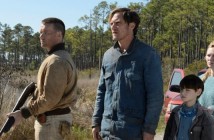
Editor’s Notes: Everest opens in limited IMAX release this Friday, September 18th and expands wide next week.
This year’s opener of the Venice Film Festival had the promises of the last three years on its icy shoulders, and the boots to fill of its Academy Award-winning opening night predecessors - Black Swan, Gravity, and Birdman. Though Everest fails to summit its unparalleled potential in such a position, a road to the Oscars is still clearly paved, albeit a treacherous and unsteady ascent.
. . .no story thread or character is gratuitous or exploitative in nature and, as an audience, we are helplessly reeled into the lives of the humans beneath the North Face hiking gear.

When reduced to the primitive basics, Everest is simply a good film; it has the star power, with the likes of Keira Knightley, Jack Gyllenhaal, and Josh Brolin amongst the extensive cast, it has the surprisingly nuanced artistic direction of Balthasar Kormakur, and it has the story. Based on the tragic 1996 Everest climbing disaster - where 16 souls were lost in one day of climbing - the film has to do very little to reel in a cash-in-hand audience. The mere mortals of society recognise Everest and its unfathomably high peak as a far-off and foreign land, out of reach to those of us who don’t have a spare $65,000 lying around to climb it; the film undoubtedly has this going in its favour. All 8,848m of Everest have so far eluded the silver screen until now, and the tantalising premise offered by Everest is just too good to miss. Whilst watching, it’s difficult to shake the notion that Kormakur is exploiting this to his advantage. The 360 degree panoramic camera pans of the mountain are truly breath-taking; Cinematographer Salvatore Totino leaves no face of Everest unstudied, no peak or trough unexplored, and no doubt that this mountain is bigger than can be comprehended. Arguably, watching Everest the film is second best to climbing Everest the mountain, if only to singularly grasp the sheer scale of the landscape.
In the end, the inescapable feeling of crushing futility is deafeningly resounding as the unchanged Everest stands ominously in the background having affected the lives of so many.
Unusually, like most films of today, Everest drops the trope of token bad guy. The cast are well-developed and sympathetic, easily satiating the audience through this absence and deflecting focus to the ever-ominous background presence of the mountain itself. Everest is not a film about man vs. man or man vs. monster; it is a film of man vs. mountain. Kormakur crafts a film around an amoral and uncompromising central character, portraying the vast wastes of cruising Boeing 747 altitude Everest as a frozen hell, as treacherous and unpredictable as Kevin Spacey on-screen. Not for one second is the audience allowed to get comfortable in the presence of Everest, and, as events unfold - we certainly have good reason not to.

The sloppy throw-around of mountaineering jargon is a tripping point in the narrative. Peripheral characters and the trusted central characters liberally reference AMS, HACE and HAPE as though anybody aside from weathered mountaineers and hikers in the audience have a clue what on Earth they are talking about. (For the less adventurous of us who would rather trek to the cinema than up a mountain - the expanded initialisms are Acute Mountain Sickness, High Altitude Cerebral Edema and High Altitude Pulmonary Edema respectively). In a way, the audience is shut out of elements of the story thanks to this failed expectancy which in turn leads to confusion, the misunderstanding of certain character arcs, and essentially large portions of the wide-spread narrative disappearing into icy crevasses, never to be seen again. This miscommunication between screenwright and audience appears to sadly derail Everest in its final act; the incoherent, jolty cuts of sheer chaos on the mountainside drags the string of audience interest and yanks it in several different directions. Much like the characters in the blizzard, the audience doesn’t know where to look or even who they are looking at onscreen.
Ultimately, Everest is a film sincere in its efforts to realise the tragedy of the true story on which it is based; no story thread or character is gratuitous or exploitative in nature and, as an audience, we are helplessly reeled into the lives of the humans beneath the North Face hiking gear. In the end, the inescapable feeling of crushing futility is deafeningly resounding as the unchanged Everest stands ominously in the background having affected the lives of so many. Those of us sitting the audience prior to the film having thought “I could do that” of the ascent and descent of Everest’s peak undoubtedly will be thinking again as the closing credits roll, and the individual tributes commence.
When reduced to the primitive basics, Everest is simply a good film; it has the star power, with the likes of Keira Knightley, Jack Gyllenhaal, and Josh Brolin amongst the extensive cast, it has the surprisingly nuanced artistic direction of Balthasar Kormakur, and it has the story.



